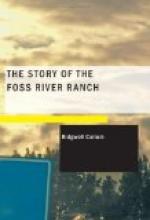Up the slope came three figures. They were moving with cautious, stealthy step, the movement of men whose purpose is not open. On they came swiftly—silently. One man led; he was tall and swarthy with long black hair falling upon his shoulders in straight, coarse mass. He was evidently a half-breed, and his clothes denoted him to be of the poorer class—a class accustomed to live by preying upon its white neighbors. He was clad in a pair of moleskin trousers, which doubtless at one time had been white, but which now were of that nondescript hue which dirt conveys. His upper garments were a beaded buckskin shirt and a battered Stetson hat. Around his waist was a cartridge belt, on which was slung a holster containing a heavy six-chambered revolver and a long sheath knife.
His companions were similarly equipped, and the three formed a wild picture of desperate resolve. Yard by yard they drew toward the sleepers, at each step listening for the loud indications of sleep which were made only too apparent upon the still night air. Now they were close upon the fire. One of the unconscious cow-boys, Jim Bowley, stirred. A moment passed. Then the intruders drew a step nearer. Suddenly Jim roused and then sat up. His action at once became a signal. There was a sound of swift footsteps, and the next instant the astonished man was gazing into the muzzle of a heavy pistol.
“Hands up!” cried the voice of the leading half-breed. One of his followers had similarly covered the half-awakened Jake.
Without a word of remonstrance two pairs of hands went up. Astonishment had for the moment paralyzed speech on the part of the rudely awakened sleepers. They were only dimly conscious of their assailants. The compelling rings of metal that confronted them weighed the balance of their judgment, and their response was the instinctive response of the prairie. Whoever their assailants, they had got the drop on them. The result was the law of necessity.
In depressing silence the assailants drew their captives’ weapons. Then, after binding their arms, the leader bade them rise. His voice was harsh and his accent “South-western” American. Then he ordered them to march, the inexorable pistol ever present to enforce obedience. In silence the two men were conducted to the bush where the first capture had been made. And here they were firmly tied to separate trees with their own lariats.
“See hyar,” said the tall half-breed, as the captives’ feet were bound securely. “There ain’t goin’ to be no shootin’. You’re that sensible. You’re jest goin’ to remain right hyar till daylight, or mebbe later. A gag’ll prevent your gassin’. You’re right in the track of white men, so I guess you’ll do. See hyar, bo’, jest shut it,” as Jim Bowley essayed to speak, “cause my barker’s itchin’ to join in a conversation.”




